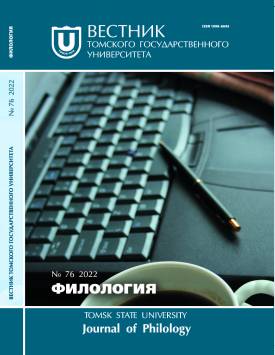The place of the predicative in the system of Russian attributive words (adverbials and adjectives)
The article focuses on the function and classification of Russian ‘predicatives’ (non-verbal predicates), such as uyutno ‘(it is) cosy’, nepriyatno ‘(it is) unpleasant’ and kholodno ‘(it is) cold’. The main problem I am solving is why the third element of the attributive system, besides adjectives and adverbials, is necessary. In the end, I conclude that predicatives have common properties both with adjectives and with adverbials. On the one hand, predicatives often describe features of situations, alternating with adjectives that characterize nominal phrases and pronouns. On the other hand, predicatives fill a lacuna in the use of adverbials, which normally cannot be used in the predicate position. Note that, in Cinque’s account, only ‘high’ VP modifiers can be used as predicatives, while for ‘low’ modifiers of mode of action this use is rare. The conclusion is that different groups of predicatives function differently. Some of them having a complement clause grammaticalize the structure with an adverbial in the predicate position. This function is somewhat different from the canonical modifier position of the adverbial because the embedded clause is mainly interpreted as a fact, and not a proposition or another type of situational meaning. Semantic properties of predicatives are reflected in their syntactic behavior. For instance, predicatives that are used analogically to adjectives but for situations (e.g., interesnyy ‘interesting’) are also parallel to them in that the complement clause is a subject (the structure Mne interesno, kto pridet ‘It is interesting to me who will come’ is parallel to Kniga okazalas’ interesnoy ‘The book turned out to be interesting’). Very often, both the predicative and the adjective can have a dative argument. I called this type of predicatives ‘predicatives of property’, since their main function is to describe the property of the situation. Other predicatives mainly denote the state of the participant. Here belong physical sense predicates, such as kholodno ‘(it is) cold’ or tesno ‘(it is) too narrow’, uyutno ‘(it is) cosy’. Some emotional predicates such as veselo ‘(it is) funny’ or grustno ‘(it is) sad’ behave in an intermediate way but are closer to the second type. They are called ‘predicatives of state’, meaning the state of the animate participant they denote. The main research method is to check formal properties of predicatives using behavioral tests and, at the same time, to search for a semantic explanation. Thus, I accept that well-known semantic classes of predicatives are closely related to their formal properties. For instance, the fact that a particular predicative strictly corresponds to the adjective use with a nominal head is reflected on the syntactic level in that the complement clause behaves as a subject in syntactic tests, just as nouns in constructions with adjectives in the predicate position. By contrast, when the predicative use primarily describes the state of the dative experiencer, the complement clause may be completely missing or be syntactically an adjunct or another type of peripheral constituent: the speaker just means that the properties of the situation taking place at the time of speech make the experiencer feel cold or cosy. The type of infinitive control can be shifted with the change of the predicative use. For instance, the predicative skuchno ‘(it is) dull’ is usually a predicative of state. The infinitive in the complement clause is normally controlled by the experiencer from the main clause. However, there are uses in which skuchno functions as an analogue of the adjective, and there the control requirement becomes less strict. For instance, in the Vse vremya zachityvat’ primery iz uchebnika skuchno dlya studentov ‘It is dull for the students if the teacher always reads out examples from the student’s book’ the infinitive zachityvat’ ‘read out’ is not controlled by the main clause argument dlya studentov ‘for the students’. Finally, my research shows that predicatives can sometimes be used with an object-like argument if a speaker does not want to mark it explicitly. The author declares no conflicts of interests.
Keywords
predicative, adjective, adverbial, noun phrase, situation, fact, infinitive, subject, coordinationAuthors
| Name | Organization | |
| Letuchiy Alexander B. | National Research University Higher School of Economics | alexander.letuchiy@gmail.com |
References

The place of the predicative in the system of Russian attributive words (adverbials and adjectives) | Vestnik Tomskogo gosudarstvennogo universiteta. Filologiya – Tomsk State University Journal of Philology. 2022. № 76. DOI: 10.17223/19986645/76/5
